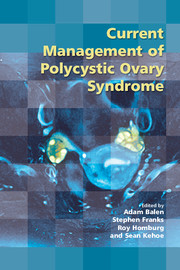Book contents
- Frontmatter
- Contents
- Participants
- Declarations of personal interest
- Preface
- 1 Overview and definitions of polycystic ovary syndrome and the polycystic ovary
- 2 Genetics and pathogenesis of polycystic ovary syndrome
- 3 Ethnic variations in the expression of polycystic ovary syndrome
- 4 Quality of life for women with polycystic ovary syndrome
- 5 Insulin resistance, the metabolic syndrome and polycystic ovary syndrome
- 6 Management of polycystic ovary syndrome through puberty and adolescence
- 7 Long-term health risks of polycystic ovary syndrome
- 8 Approaches to lifestyle management in polycystic ovary syndrome
- 9 Management of obesity in polycystic ovary syndrome, including anti-obesity drugs and bariatric surgery
- 10 Definition of hyperandrogenism
- 11 Treatment of hyperandrogenism in polycystic ovary syndrome
- 12 Choices in the treatment of anovulatory polycystic ovary syndrome
- 13 Predictors of ovarian response to ovarian stimulation: progress towards individualised treatment in ovulation induction
- 14 Surgical management of anovulatory infertility in polycystic ovary syndrome
- 15 The role of insulin-sensitising drugs in the treatment of polycystic ovary syndrome
- 16 The role of in vitro maturation of oocytes for anovulatory polycystic ovary syndrome
- 17 Acupuncture and/or herbal therapy as an alternative or complement for relief of polycystic ovary syndrome-related symptoms
- 18 Consensus views arising from the 59th Study Group: Current Management of Polycystic Ovary Syndrome
- Index
7 - Long-term health risks of polycystic ovary syndrome
Published online by Cambridge University Press: 05 July 2014
- Frontmatter
- Contents
- Participants
- Declarations of personal interest
- Preface
- 1 Overview and definitions of polycystic ovary syndrome and the polycystic ovary
- 2 Genetics and pathogenesis of polycystic ovary syndrome
- 3 Ethnic variations in the expression of polycystic ovary syndrome
- 4 Quality of life for women with polycystic ovary syndrome
- 5 Insulin resistance, the metabolic syndrome and polycystic ovary syndrome
- 6 Management of polycystic ovary syndrome through puberty and adolescence
- 7 Long-term health risks of polycystic ovary syndrome
- 8 Approaches to lifestyle management in polycystic ovary syndrome
- 9 Management of obesity in polycystic ovary syndrome, including anti-obesity drugs and bariatric surgery
- 10 Definition of hyperandrogenism
- 11 Treatment of hyperandrogenism in polycystic ovary syndrome
- 12 Choices in the treatment of anovulatory polycystic ovary syndrome
- 13 Predictors of ovarian response to ovarian stimulation: progress towards individualised treatment in ovulation induction
- 14 Surgical management of anovulatory infertility in polycystic ovary syndrome
- 15 The role of insulin-sensitising drugs in the treatment of polycystic ovary syndrome
- 16 The role of in vitro maturation of oocytes for anovulatory polycystic ovary syndrome
- 17 Acupuncture and/or herbal therapy as an alternative or complement for relief of polycystic ovary syndrome-related symptoms
- 18 Consensus views arising from the 59th Study Group: Current Management of Polycystic Ovary Syndrome
- Index
Summary
Polycystic ovary syndrome (PCOS) is a lifelong disease. It is most often diagnosed in adolescents and young women who present with symptoms of hyperandrogenism and/or disorders of ovulation. From that moment, the individuals and their doctors must be aware that PCOS carries various long-term health risks owing to its intrinsic hormonal derangement and also to the associated metabolic disorders such as obesity, hyperinsulinism and insulin resistance, hyperlipidaemia and pancreatic β-cell dysfunction. The pubertal onset of PCOS thus provides a unique opportunity to detect these risks early and to engage preventive measures.
Although many intermediary risk factors are present in most women with PCOS, the risks for the occurrence of clinical events are difficult to quantify precisely in the absence of large-scale prospective studies. The few available epidemiological studies are difficult to compare with each other and are not conclusive because different definitions for PCOS have been used, series were sometimes small and some included individuals who were too young to be exposed to the events predicted by the risk factors.
Increased cardiovascular risk
The increased cardiovascular risk in women with PCOS has been extensively discussed in the recent literature, as reviewed by Rizzo et al. While there is no doubt that many cardiovascular risk factors are present to various degrees in women with PCOS, a clear-cut demonstration of an increased prevalence of cardiovascular events in comparison with age-matched women without PCOS is still awaited.
Keywords
- Type
- Chapter
- Information
- Current Management of Polycystic Ovary Syndrome , pp. 85 - 92Publisher: Cambridge University PressPrint publication year: 2010



